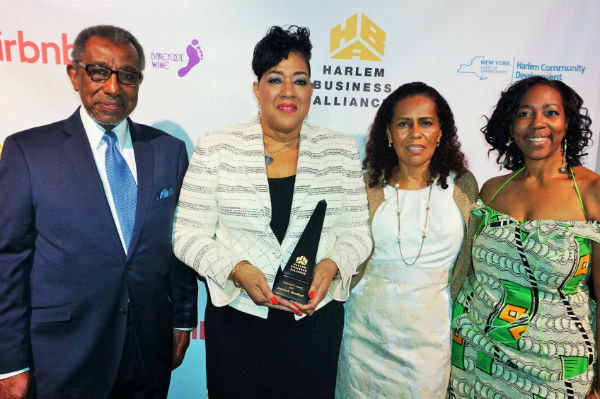 A new report released today by the Center for an Urban Future (CUF) urges Mayor-elect Adams and the incoming City Council to create 10,000 new Black- and Latino-owned businesses.
A new report released today by the Center for an Urban Future (CUF) urges Mayor-elect Adams and the incoming City Council to create 10,000 new Black- and Latino-owned businesses.
They request this over the next five years and establish a Technical Assistance Corps that would bring door-to-door counseling to every small business operating in a low- or moderate-income neighborhood by the end of 2022.
The report offers a blueprint with 10 policy ideas for helping New York City’s minority-owned businesses make a full recovery from the COVID-19 pandemic, with a focus on supporting new BIPOC entrepreneurs and investing in neighborhood-based small business services that help existing minority-owned firms become stronger, more competitive, and more resilient.
The report’s recommendations were based on three key research findings:
- ) Prior to the pandemic, fewer than 10 percent of New York City’s businesses were owned by Black and Latino New Yorkers, despite making up over half (51 percent) of the city’s population. Those numbers are likely considerably lower today, following a year in which minority-owned businesses were hit hardest by the COVID crisis.
- ) Far too many of the city’s existing minority-owned businesses were financially fragile even before the pandemic. The city’s average minority-owned employer business generated less than half the revenue (45percent) of the average white-owned employer business. Strikingly few of them had built up e-commerce capabilities or taken advantage of online marketing opportunities.
- ) Few of New York’s minority-owned businesses benefited from city-supported business assistance programs prior to the pandemic. In many of the city’s low- and moderate-income communities, resources for small businesses are extremely limited. At the same time, hardly any of the organizations that do provide high-level advising or technical assistance have the resources to provide one-on-one assistance where the business is located.
The report, which was made possible thanks to a grant from JP Morgan Chase, includes multiple recommendations focused on expanding neighborhood-level assistance for small businesses, especially in the many low-income communities that have long operated with few or no small business support resources. For instance, the report urges the incoming administration to build new infrastructure to support commercial districts that don’t have BIDs and to create neighborhood-level, post-pandemic marketing campaigns to promote local shopping, dining, and services.
Key recommendations from the report include:
Establish a Technical Assistance Corps to bring door-to-door counseling to every small business operating in a low- or moderate-income neighborhood by the end of 2022. The Corps would provide new resources to help expand staff capacity of effective community-based organizations (CBOs) and tap local MBA students, retired business executives, and even out-of-school young adults who have lived or worked in these communities, speak the languages of local business owners, and have expertise to offer.
Create neighborhood-level, post-pandemic marketing campaigns to promote local shopping, dining, and services. Following an extended period where many businesses earned a fraction of typical revenues, business owners need customers and sales to return to levels at or close to what they were prior to the pandemic. The city can help with a neighborhood-focused marketing and promotion campaign that makes modest marketing grants to dozens of commercial districts across the city, enabling local entities to design and implement promotional campaigns that they believe will work best for their unique neighborhoods’ businesses.
Build new infrastructure to support commercial districts that don’t have Business Improvement Districts (BIDs). Specifically, the city should provide funding for a part-time staff person to support local merchants along retail corridors that currently lack a BID. The resources would go a long way toward empowering merchants associations and other small business support groups, many of which operate without the capacity to assign staff to regularly check-in on merchants, communicate information about new city rules and regulations, deliver supplemental services like sanitation and security, or put up holiday lights.
Spark 10,000 new Black- and Hispanic-owned businesses by 2026. City policymakers and economic development officials should set a goal of increasing the number of Black- and Hispanic-owned businesses by 50 percent over the next five years—and, to meet that goal, implement a series of policies that greatly increase support for aspiring minority entrepreneurs. There are already signs that growing numbers of New Yorkers are starting businesses. With targeted policies, the city can ensure that Black and Latino entrepreneurs are a big part of this entrepreneurial renaissance.
“New York needs a long-term small business recovery plan that is squarely focused on boosting the smallest, most vulnerable businesses— one that supports them on the long recovery ahead and gives them the best chance of coming back even stronger,” said Jonathan Bowles, executive director of the Center for an Urban Future. “This will require an enormous push to meet small businesses where they are.”
The report was informed by more than 50 interviews with business owners and small business experts, and six roundtable discussions with business leaders located in Southeastern Queens, Central Brooklyn, Chinatown, Harlem, the South Bronx, and the West Bronx.
“We as nonprofits are working hands-on and one-on-one with business owners to get them social media, and get them Shopify accounts, and other technology help they need, but it’s certainly not meeting the needs of a fraction of the population of businesses in the Bronx that need it,” says Kerry McLean, vice president of Women’s Housing and Economic Development Corporation (WHEDco), a South Bronx–based community development organization.
“Black people, we found, really need to be surrounded by resources and individuals who care deeply about their success,”
“Black people, we found, really need to be surrounded by resources and individuals who care deeply about their success,” says Regina Smith of Harlem Business Alliance. “Who delivers those types of services? It’s community-based organizations that have been working in these communities for decades. We found that our clients don’t necessarily get that type of love and hand-holding assistance from other entities.”
“We have an opportunity now with so many young people who are unemployed and have that technology background, because not everyone has a son or daughter to help them with the technological things needed to run a business these days.”
Janet Rodriguez, founder, and CEO of SoHarlem, a nonprofit that incubates and supports small businesses in Harlem, says that the city should tap out-of-school youth who could help firms with their digital skills and social media savviness. “We have an opportunity now with so many young people who are unemployed and have that technology background because not everyone has a son or daughter to help them with the technological things needed to run a business these days.”
“A lot of our small businesses here in Harlem aren’t technologically where they need to be,” says Gina Ramcharan, program director of The Lillian Project, a program of Harlem Business Alliance that incubates businesses owned by Black women. “It’s not just bringing them into 2021; some of the small businesses still need to be brought into 2017.”
Please click on the link to view the full report, titled “No Small Relief: Strengthening NYC’s Most Vulnerable Small Businesses.”
The Center for an Urban Future (CUF) is an independent think tank focused on creating a more inclusive economy in New York and expanding economic opportunities for all New Yorkers. This report is the latest in a long series of studies by CUF exploring how to help strengthen and scale up New York City’s small businesses.
Become a Harlem Insider!
By submitting this form, you are consenting to receive marketing emails from: Harlem World Magazine, 2521 1/2 west 42nd street, Los Angeles, CA, 90008, https://www.harlemworldmagazine.com. You can revoke your consent to receive emails at any time by using the SafeUnsubscribe® link, found at the bottom of every email. Emails are serviced by Constant Contact








